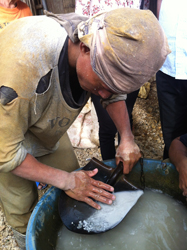
Philippines Local Governments Seek the Gold Standard in Transparency
The importance of gold mining, and small-scale operations in particular, to the national and local economies of the Philippines cannot be overstated. Gold is the number-one mineral produced in the archipelago in value terms, and studies indicate that small-scale mining activities contribute 80 percent of gold production in the country.
However, lack of proper regulation and oversight threatens the ecosystem and the health of Filipinos, and creates a divisive environment at the local level. (For example, much of small-scale mining happens inside large-scale mining areas, complicating formalization and resulting in conflict between large-scale and small-scale miners.)
The first step in addressing these issues is obtaining reliable information on the mining operations and their impact at the local level. Extractive Industries Transparency Initiative (EITI), at its inception, only required aggregate information on payments to the central government from all extractive operations in a country. Some countries, notably Ghana, included comprehensive local level information under EITI. But this has not been the norm. EITI has since updated its rules under the new EITI Standard (adopted in 2013) and has a much stronger subnational emphasis. Data required in reporting includes amount of resource revenue transferred to subnational governments including the formula used and certain resource rents collected directly by subnational governments.

A miner from Barangay village in T’boli (South Cotabato Province) pans gravel for gold.
The Philippines EITI Multi Stakeholder Group released key findings of the country’s first-ever report on December 10, 2014. The report includes subnational data such as mining taxes imposed by the central government and collected by local governments (such as business taxes); fees imposed and directly collected by local governments (such as environmental fees); resource revenues transferred from the central government to local governments in resource-rich provinces (such as royalties); and regular inter-governmental transfers to all local governments.
Subnational EITI scoping led by the EITI multi stakeholder group now provides an opportunity to examine how local governments exercise their powers of taxation in connection with extractive activities, and whether local taxes are commensurate with the impacts of extractive operations in each area. Including subnational data in EITI provides a rich set of information for subnational stakeholders—local governments, civil society, indigenous groups and companies. Yet, in the absence of a local-level multi-stakeholder platform, it becomes difficult for subnational stakeholders to discuss and act on the report’s findings. Also, revenue flows that have a disproportionate impact at the local level have not all been captured in the national EITI report. For example, production volumes and payment amounts by small-scale miners to local governments are not captured in the national-level EITI report.
NRGI and civil society partner Bantay Kita (which is a CSO member of the multi-stakeholder group that oversees EITI in the Philippines), have recently worked in two subnational areas, Compostela Valley Province on the island of Mindanao and T’boli in neighboring South Cotabato Province, on these issues. The two organizations and local actors together developed multi-stakeholder councils that have produced data that is most relevant at the local level.
For example, the templates agreed by the multi-stakeholder council in Compostela Valley require indigenous groups to disclose payments received from companies, and companies to disclose payments made to each indigenous group. Now that it is available, such information can be included in future national EITI reports. In addition, the council set out transparency rules on free, prior and informed consent (FPIC); contract awards; and revenue payments, collection, management and expenditure. The Compostela Valley government is working on enacting legislation to ensure sustainability of this subnational transparency mechanism beyond the tenure of the present governor.
“While payments were made by companies to government, it is still difficult to link the contribution of the extractives industry to local/community development,” said the national coordinator of Bantay Kita, Cielo Magno. “This is because of weak regulatory and monitoring capacity of the national and local governments. Participatory governance is key to improving natural resource governance in the country and one way to do this is to institutionalize EITI mechanisms at the subnational level.”
Varsha Venugopal is NRGI’s subnational capacity development program officer. Roslita Arsyad is NRGI’s Asia-Pacific regional associate. Marietta Cauchi is a lawyer, journalist and NRGI consultant.

